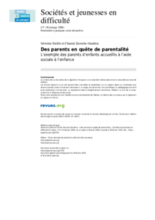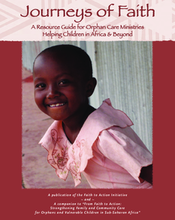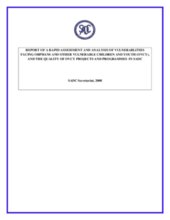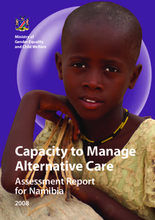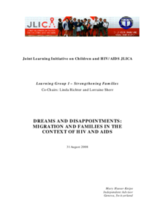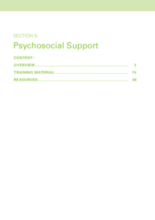Displaying 13651 - 13660 of 14579
Durant les mois précédant l’adoption des lignes directrices par l’Assemblée Générale des Nations Unies, une nouvelle série spéciale du Bulletin s’est intéressee aux principes et recommandations qu’elles consacrent, ainsi qu’à leurs implications concrètes pour la protection des enfants pris en charge.
Cet article vise à analyser le point de vue des parents dont un enfant est accueilli en famille d’accueil au titre de l’ASE, sur des questions relatives à leur identité parentale et à leur relation avec les professionnels.
Ces publications sont plus particulièrement destinées aux Autorités des Membres de la Conférence chargées d’appliquer les Conventions et peuvent représenter une source d’information utile pour les praticiens – juges, avocats, huissiers, travailleurs socia.
This resource is designed to be used as a guide for those in the Faith community working with orphaned children.
This study sought to assess, analyse and inform the different forms of vulnerabilities affecting children and youth, and their effects and existing strategies and programmes addressing the challenges and vulnerabilities facing orphans, vulnerable children and youth (OVCY) in the Southern Africa Development Community (SADC) region. The study also sought to propose recommendations for improvement, and development of minimum standards for OVCY and the finalisation of the SADC OVCY Strategic Framework.
The study reported by Shihning Chou and Kevin Browne explored the link between institutional care for young children and international adoption, using a survey of 33 European countries. The evidence suggests that, rather than reduce the number of children in institutions, international adoption may contribute to the continuation of this harmful practice. A child rights-based approach to providing alternative care for children separated from their parents is proposed.
In this commentary, Kevin Browne and Shihning Chou focus on the issues raised by the critical responses to their article in Adoption & Fostering.
This report prepared for the Ministry of Gender Equality and Child Welfare (MGECW) with financial support from UNICEF Namibia assesses the country’s capacity to manage alternative care systems for children.
This review explores the short- and long-term implications of migration for families in the context of HIV and AIDS, focusing mainly on sub-Saharan Africa.
Contains guidance on how to develop programs to respond to the psychosocial needs of children affected by emergencies. Includes a training schedule, worksheets, and handouts.


